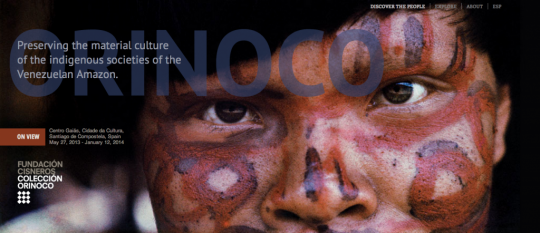Orinoco Meets Spain
This past Monday I had the great pleasure of being in Spain for the opening of our family’s Amazonian collection “Orinoco: Journey to a Lost Worldâ€. We are thrilled to bring this collection to Spain for the first time and are excited to be able share the cultures of the thirteen different tribes in our region of the amazon with Spain. For this blog I have asked my mother, Patricia Phelps de Cisneros, to be my guest writer. I hope you enjoy it.
Orinoco. “Journey to a Lost World Openingâ€
Words of Patricia Phelps de Cisneros,
Santiago de Compostela, May 27, 2013
I remember with joy the smile on my daughter Adriana’s face when returning to our camp in the Venezuelan Amazon after playing all day with children from the Yanomami tribe. This was part of her routine, as two weeks a year my husband Gustavo and I took our children deep into the Orinoco to coexist with the local cultures, which they learned to love and respect dating back to their infancy. These trips and numerous expeditions that we conducted beginning in the 70s are certainly a memorable part of our family history, and the birth of what is today the Orinoco Collection.
The rigor with which we undertook these voyages likely grew from my grandfather William H. Phelps and his experiences and life lessons that he shared with us. William H. Phelps was a naturalist as passionate as Schomburgk or Humboldt. His deep love for the physical and human geography of his adopted Venezuela led him to create the ornithological Phelps Collection, now recognized as one of the largest in the world. His passion as an explorer leads him to undertake tours of unparalleled scientific discoveries. His research discipline and skills helped to create a cultural reference of the history of our country. For us, his vision was inspirational, and our efforts in the lands of the Orinoco is in great part a tribute to his work, to his desire to preserve the culture of the ethnic groups of the Orinoco, which are as fragile as the birds in our skies.
With these principles in mind we undertook expeditions that submerged us into the richness and variety of the indigenous cultures of Venezuela, that despite the cultural hybridization process, fight to maintain its authenticity and ethnic tradition. With the support and vision of Gustavo, we established the Manaka Camp, located at the convergence of the Orinoco the Ventuari, the native land of the Piaroa, Yabarana and Yekuana, and one of the most pristine Amazonian ecosystems in extraordinary condition with exceptional native vegetation.
With each passing year we noticed significant changes in the cultural processes of these communities, and today we have only a few remnants and testimonies of a nearly lost history. The remaining relics are objects of worship or of practical use that mean something beyond their shape, abstract designs and decorations, allowing us peek into the ​​cosmogony and theology of these peoples. This instilled in us the desire to study their material culture and aesthetic practices, and preserve vases, figurines, rattles, etc. that have survived. Along with my husband and our three children Gustavo Guillermo, Carolina and Adriana, dazzled by such wonderful artifacts, we began to collect items on which we found the pattern of symbols representing these cultures, reminiscent of ancient traditions that have been perpetuated to this day; objects from the jungle we now wish to share through this show and our website orinoco.org, where visitors can explore the collection and the rich culture of the ethnic groups in depth.
For more information, visit:
Lorem ipsum dolor sit
Lorem ipsum dolor sit amet, consectetur adipisicing elit, sed do eiusmod tempor incididunt ut labore et dolore magna aliqua. Ut enim ad minim veniam, quis nostrud exercitation ullamco laboris nisi ut aliquip ex ea commodo consequat.
Read More

